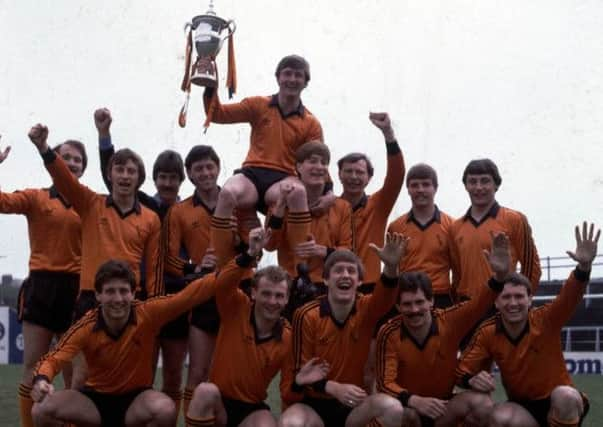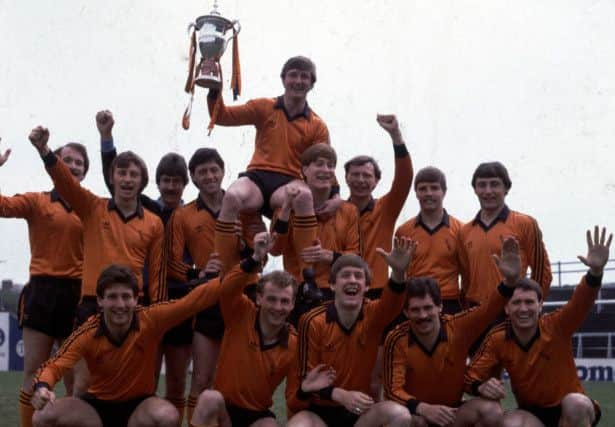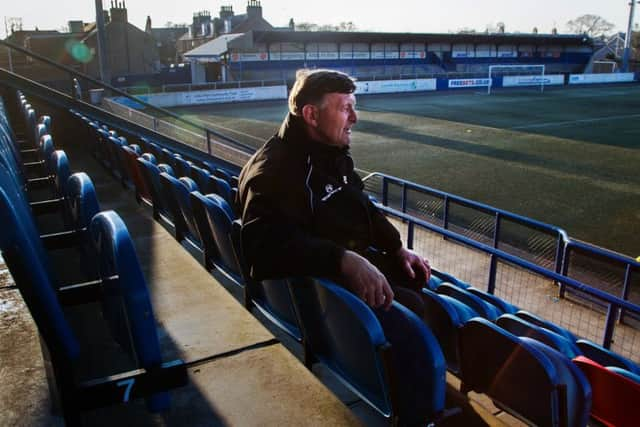Interview: Dundee United legend Paul Hegarty


Older readers might remember Kevin as a perfectly serviceable striker over a season or two at Hearts, as might fans of Carlisle, East Fife, Morton, Dunfermline, Berwick Rangers, Falkirk and even Haddington Athletic.
In contrast, Paul stayed put mostly, making his name at Dundee United, for whom he played 707 times, after starting his career with Hamilton Accies.
Advertisement
Hide AdAdvertisement
Hide AdThere isn’t any argument over who enjoyed the more productive football career. Paul once stood 90 minutes from a European Cup final, was skipper in a Uefa Cup final and played eight times for his country, including once as captain.


But there’s an undeniably wistful tone in Paul’s voice when he considers the case of Kevin, who, by learning a trade, managed to avoid the uncertain, often cruel, nature of life after the final whistle blows. “Kevin was a determined player,” he says. “But I think he had read the script. He realised that he was not going any further and so he became a printer, and now he is retired. Sometimes I wish I’d done the same!”
Hegarty is putting in the miles now. In November he started his first job outside football since his meagre earnings as a part-timer with Hamilton were supplemented by a £12-a-week desk job at Scottish Widows in Edinburgh, his hometown. Now an extremely young-looking 60, he feared he had hit a brick wall when it comes to full-time coaching positions.
“I deliver electrical stuff,” he says. “They call it – not me, I hasten to say – ‘a logistics courier’. In any other language, it’s a van driver. But I have to pay the bills like everyone else. You just have to do it.
“I applied for loads of jobs within football. Nothing happened. I am delivering all over the country. I was in Edinburgh today, Rosyth too. I can go as far as Aberdeen, Inverness…”


There is a road Hegarty is currently keen to avoid – the one leading to the Highland League. Christopher, the second youngest of four sons, now turns out for Buckie Thistle, meaning he and his father could encounter each other in a league fixture before long.
Hegarty recently made a welcome return to the game as manager of Montrose. The Angus club are bidding to halt a worrying slide that could potentially deposit a club based just 30 miles north up the coast from Dundee in the Highland League next season.
While it is still mathematically possible that Montrose, who are 12 points adrift at the bottom of League 2 with four games to play, could avoid finishing last, they need a miracle, starting today against East Stirlingshire. The reality is they will be pitched against either Brora Rangers or Edinburgh City in an inaugural pyramid play-off final next month. “I don’t want to be the first manager to take Montrose into the Highland League,” stresses Hegarty, who is being assisted by John Holt, his former Dundee United team-mate. “I don’t want to do that. And I have told the players that: you don’t want to be the first team to go into the Highland League from the SPFL.
Advertisement
Hide AdAdvertisement
Hide Ad“In football circles, people might ask, Montrose, why did he take the Montrose job? They have gone for experience, but like I said to the directors: don’t forget, we can’t play anymore.
“People ask why have I taken it? Well actually I think it is quite brave. I thought why not? It’s a chance to get back in the game. If people see me back in the game, they might say, ‘Well, he has done not bad at Montrose’.”
But surely it is his resilience that is most likely to impress onlookers. Despite the knocks, the countless blows he has suffered in the managerial game, he is still here. Hegarty is waving a flag for the older generation at a time when the trend is for clubs of similar size and standing to Montrose to place their faith in young tyros such as Barry Ferguson, who was in the opposite dugout last weekend as the Not-So-Mighty Mo fought out a 2-2 draw with Clyde.
FOR someone reckoned to be among the nicest characters in the game, Hegarty’s experiences in management form a mostly heart-breaking litany of harsh judgment calls from impatient owners. It is possible to forget that as recently as 2013, he was back in the frontline as stand-in Dundee United manager, following Peter Houston’s departure.
He was all set to take charge of the team once again against Motherwell, but a waterlogged pitch meant the match was postponed at short notice. By the time the next game came around, Jackie McNamara had been appointed, meaning the legendary skipper was out on his ear, not for the first time at United. He holds no grudges. “What’s the point?” he asks.
He does wonder whether he has been badly served by the number of times he has provided cover at clubs since stepping into Alex Miller’s shoes at Aberdeen in early 1999. Hegarty was charged with keeping the Pittodrie side in the top flight. While he succeeded in this aim he lost out to Ebbe Skovdhal for the permanent post, setting the trend for a coaching career that seems to consist largely of situations that unravelled through little fault of his own.
“The only one that really irks me is the Aberdeen one,” he says. “I did OK. I was told if I kept them up the job’s yours. Obviously it did not work out. Stewart Milne wanted to go down another avenue, which was Ebbe Skovdahl. Because I was a caretaker manager, the press latched on to it and you are pigeon-holed as a caretaker manager for evermore.
“That phrase ‘caretaker manager’, it eats away at you,” he adds. “At Aberdeen, I was 44, a good age. I felt comfortable there. I was just breaking through… You get a few dunts, but you have to get on with it. But that was the one I would say… I was quite upset.”
Advertisement
Hide AdAdvertisement
Hide AdHis current berth at Montrose completes a circle of sorts. Hegarty’s first managerial experience was in Angus, with Forfar Athletic, where he was appointed player-manager in 1990 after a short stint with St Johnstone. They were different times. Now a young manager is likely to have a chaperone such as the arrangement at Hearts, where Craig Levein is a sounding board for Robbie Neilson, and Raith Rovers, where Grant Murray has Maurice Malpas.
Who did Hegarty turn to? He ponders this question for a moment. “In our day, it was more a case of ‘on you go’. Now you don’t really have that, people are there to offer help. But I suppose I could have phoned Gordon Wallace, Archie Knox, Walter Smith…”
Not Jim McLean? It’s a telling omission, of course. And it means we are edging nearer the subject that is hard to avoid when speaking with any footballer whose career was forged at Tannadice during the 1970s and ’80s.
McLean looms large in the lives of so many of Scotland’s finest players. This being so, it is strange a great majority of them shared such a complicated and often fraught relationship with their manager, whose health is now sadly ailing. In the case of Hegarty, the uneasy relationship that developed between legendary manager and legendary skipper is particularly striking.
After all, had McLean not taken a chance on Hegarty when hoisting him up a level from Hamilton Accies? Did they not work together for the best part of 17 years. And was it not inspiration on McLean’s part that turned Hegarty from a striker who was a yard too slow into an international-class centre-half?
This sudden switch is illustrated by the team lines in Dundee United’s official history tome, where a string of 9s denoting Hegarty’s shirt number suddenly turn to 5s towards the end of the 1975-76 season.
“Wee Jim thought I was going to replace Andy Gray, who he knew was going down south,” explains Hegarty. “But he quickly realised this was not going to work out.” McLean, who spent £27,500 on this faltering striker, was not prepared to give up on the player, as much for the sake of his own pride, Hegarty suspects.
“He put me back into midfield for a short time,” he says. “I was not quick enough there either and neither did I have the best vision in terms of seeing passes. So the last throw of the dice was at centre-half. We got knocked out of the third round in the Scottish Cup and so when the fourth round was being played, we had a free Saturday. Wee Jim organised a game against Everton.
Advertisement
Hide AdAdvertisement
Hide Ad“I was up against Bob Latchford, the current England striker. I did all right. I wouldn’t say I was brilliant but I did a reasonable job and it was 0-0. That just shows you the narrow line between success and failure. Because if it hadn’t worked there, I would have been out of the door, down another division and then probably into junior football.”
Since McLean agreed to write the foreword to Hegarty’s autobiography, Heading for Glory, published in 1987, it is fair to assume he ended up cherishing the player who made so much of himself. “Did he?” wonders Hegarty.
In the autobiography sitting on the table in front of us – “a lot of water has gone under the bridge since then,” he says, seemingly embarrassed that a copy still exists – Hegarty mentions an occasion when he and his wife, Linda, met McLean and his wife, Doris, at a function. The wives got on like a house on fire, so much so that the Hegartys were invited back to Chez McLean for a coffee, much to Paul and no doubt Jim’s horror.
“What did you say yes for?” asked Hegarty, as he and his wife drove to Broughty Ferry. “I will get pelters!” And so it proved. The next game finished 0-0 at Hibs, and though Hegarty concedes he was not brilliant, he was no worse than the rest. “But I got absolutely slaughtered.” A line, it seemed, had been crossed.
McLean’s foreword contribution in Hegarty’s autobiography is a masterpiece in taciturn, tight-lipped acclaim. “He [Hegarty] was involved in one of the first big transfers we turned down, when Tottenham Hostpur wanted to buy him,” he writes. “He accepted the directors’ decision and has since given tremendous service to Dundee United.”
Ah, Spurs. When McLean says Hegarty was “involved” in the transfer, the player himself does not remember it quite like that. “That is my only regret,” says Hegarty, of the London club’s re-buffed approach in the late 1970s.
“What he [McLean] told me was, ‘we’ve had a bid from Spurs, we turned it down’. What they did do was put me on a pension and while it was all right, it was nothing like I would have got [at Spurs]. There’s no doubt I would have gone if offered the chance. I might not have been very good, I might have been up the road in a year, but I would have gone.
“They signed a lad called John Lacy from Fulham instead – that could have been me,” he adds.
Advertisement
Hide AdAdvertisement
Hide Ad“Paul Sturrock had the chance to go to West Ham, and they knocked back a bid that was for much more than me,” continues Hegarty. “Sturrock, Narey and myself were on these so-called lucrative pension schemes – but they were nothing compared to wages at big clubs.”
Hegarty was granted the opportunity to establish exactly what happened when Keith Burkinshaw, the manager who wanted to buy him, turned up at Aberdeen as director of football while he was a coach at the club.
“I said to Keith, ‘You were Spurs manager, you were after me. How could you not have tapped me up like any other manager?’
“ ‘Oh, we were scared of Wee Jim’, he said. ‘By the way, what was the bid?’ I asked? ‘It was £350,000, then £450,000’. I’d been told it was £250,000. Keith said they were told I didn’t want to leave United.”
As McLean alludes to in his foreword, at the time Hegarty had little option but to shrug off the disappointment and get on with things. But years later, he tortured himself further by extracting more details from Burkinshaw.
“I asked Keith, what were the wages like in 1979? He told me £850-£1000 per week, with appearance money and endorsements on top of that. That was the year they signed Ossie Ardiles and Ricky Villa and obviously they had Hoddle as well. I think my wages were about 180 quid at the time. I don’t hold grudges. I just want people to be up front.”
Had Hegarty headed to Spurs, he would have missed out on beating Barcelona home and away, a European Cup semi-final and, of course, skippering United to that league title success at Dens Park, home of their fiercest rivals, on the last day of the 1982-83 season. “Remember that old clock at Dens Park in the corner?” he asks. “I kept looking up at that and it seemed to stay at half past four forever. It is only when your career is over that you realise you gave people so much pleasure.”
Unlike that afternoon at Dens, time is moving on. Kick-off in another derby at the same stadium is approaching. The endlessly courteous Hegarty obliges with a lift to a game he isn’t attending himself.
Advertisement
Hide AdAdvertisement
Hide AdFans bedecked in black and tangerine pass the car as he drops off his grateful passenger, who is sorely aware of the weirdness of the situation.
Like so many who grew up following the fortunes of the dark blue team in the city, this writer had his heart broken more times than he’d care to remember by the team led by the relentlessly dogged competitor sitting in the driver’s seat.
But those now peering into the car – “Is that really Heggie?” – are some of those he once helped make happy. “We were a good team,” he reflects. “It is only now you realise how good we were. At the time you didn’t. You just got on with it. It was a job. Every game seemed crucial. Every game seemed to be a cup final, harder than the last one. That’s the way it was then.”
Hegarty extends a hand. “Good luck,” he says – he is so nice, he is probably even being sincere – before waving you off, a gentleman to the end.